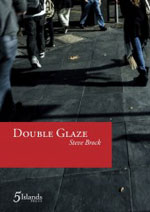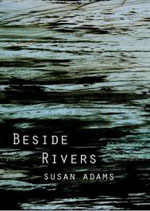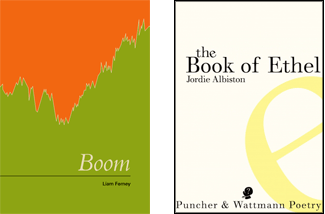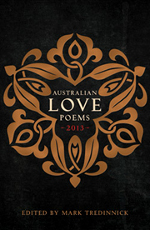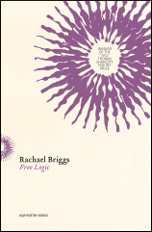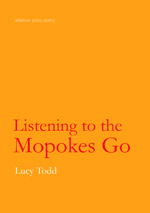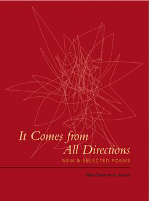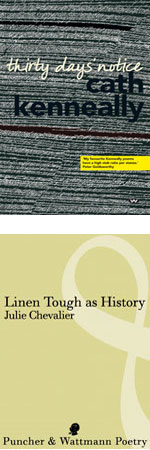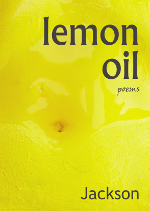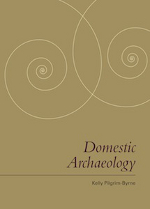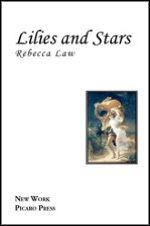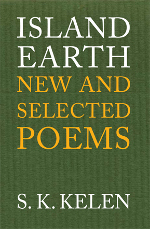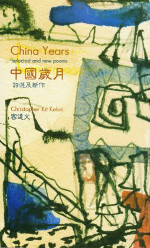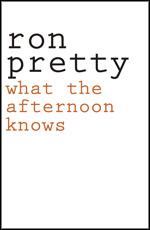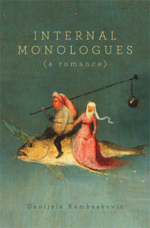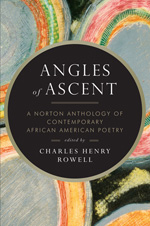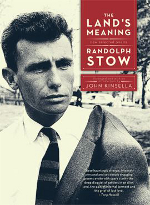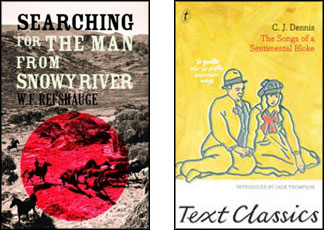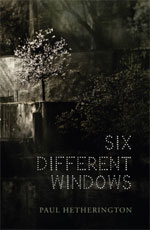BOOK REVIEWS
Review Short: Steve Brock’s Double Glaze
In his most recent collection, Double Glaze, Steve Brock moves the orderly reader from the very public realm of ‘Work’, via ‘The Commute’, to dwell with ‘Writing’ and finally to settle in, arguably the most intimate of registers, ‘Family’. Although poetic work rarely arrives in convenient clusters, a poet’s choice in manuscript arrangement is not arbitrary; it intimates the conceptual webbing informing the collection’s central aesthetic, thematic, and in this case, socio-political, preoccupations.
Review Short: Damian Balassone’s Daniel Yammacoona
The first three poems in Damian Balassone’s Daniel Yammacoona are about women who have been left by men. In each case the man appears to be the hero of the story, yet the woman is not necessarily unheroic; in at least two of the poems the heroism is one of steadfastness.
Review Short: Susan Adams’s Beside Rivers
The poems in Susan Adams’s Beside Rivers are arranged in three sections: Awash, A Wonder, and Wander By Water. The cover blurb states ‘Susan Adams’s first book shines with imagery and clear eyed veracity …’; although many poems do shine, I’m not convinced that I found the ‘clear eyed veracity’ worked as well as the blurb suggested, nor that the imagery was always as successful as the poet intended.
David Gilbey Reviews Jordie Albiston and Liam Ferney
Jordie Albiston’s the Book of Ethel and Liam Ferney’s Boom illustrate two dramatic obverses in contemporary Australian poetry. Both are cleverly crafted; both have levels of subtlety and manifest strength; both are linguistically sinuous and inventive, taking liberties with conventional style and syntax; both use local vernaculars in contexts of global cultural pressures; both focus, often minutely, on particular individuals caught at moments of historical change and significance and, therefore, articulate and explore ‘political’ consequences and issues; both play – gloriously, ironically, iconoclastically – with language registers as a way of exposing implied ‘bigger pictures’. And yet these two collections are worlds apart in focus, style, nuance, framing and poetic affect.
Keri Glastonbury Reviews Australian Love Poems 2013
In his 1951 essay ‘Against Poets’, Polish writer Witold Gombrowicz describes the poet ‘as a being who can no longer express himself as much as someone who must express – a Poem’. With such sentiment in mind I approached Australian Love Poems 2013 with some apprehension. Despite all the lofty rhetoric surrounding love poetry – and, understandably, there is plenty of it in the eloquent, generous introduction to this anthology by editor Mark Tredinnick – would it ultimately prove, as Gombrowicz might suggest, to be a ‘boring orgy’?
Review Short: Rachael Briggs’s Free Logic
Winner of the 2012 Thomas Shapcott Prize, Free Logic is the debut collection from poet and philosopher Rachael Briggs. The book is divided into nine sections, each poetically exploring themes of love, identity, and sexuality. Briggs infuses her poetic explorations with surreal allegories, moments of metamorphosis and a constant teasing of the ‘logical’, which allow for her poetry to forge an opening towards new possibilities. Briggs strikingly connects insightful fantasies with philosophical considerations.
Review Short: Lucy Todd’s Listening to the Mopokes Go
‘Mopoke’ is the onomatopoeic nickname of the Southern Boobook or Tasmanian Spotted Owl, known in New Zealand (where I come from) as a ‘morepork’. This bit of idiom in the title of Lucy Todd’s debut chapbook prepares the reader for a collection attuned to its locality.
John Jenkins Reviews Rae Desmond Jones
For more than 40 years, Rae Desmond Jones has remained one of Australia’s most challenging and rewarding poets, and in my opinion a major one, who has pursued an often hilarious, always astonishing and sometimes grimly confronting campaign against dullness, comfortable formulas and poetic complacency; and Grand Parade is to be applauded for drawing together some of his best work here.
Kevin Brophy Reviews Geoff Page
In a 2007 review of one of Geoff Page’s previous verse novels, Lawrie & Shirley, Peter Goldsworthy names Page as a verse-novel ‘multiple offender’ in the excellent company of Murray, Porter, Wearne and Rubinstein. Goldsworthy approaches discussion of the form by reflecting, ‘If poetry is the most ancient literary form, as old as music, then the verse novel is surely the most ancient form of poetry, using the word novel loosely’ (Australian Literary Review, May 2007). The long and respectable polygamous marriage of poetry with narrative and history was, we might say, dissolved during the Romantic period, allowing the novel to find its ecological niche – and more than a niche, a whole territory.
Dominique Hecq Reviews Julie Chevalier and Cath Kenneally
Often, we are immersed in our world as in body-temperature water, treading along effortlessly, unaware of distinction between self and medium. We have to thank poets for splashing water in our faces, for reminding us of the distinction. The splash may also refresh – perhaps move us to stop treading and begin noticing the bubbly and at times murky stream of language in which we are immersed. I thank both Julie Chevalier and Cath Kenneally for their vigorous splash. Take a big breath. We are under water, where strange things happen.
Review Short: Mark Reid’s Looking out from Bashan: the republic of Og
Mark Reid’s poetry has always delighted and challenged me. His distinctive voice and finely-tuned ear for just the right music has given his work a potency that’s been hard-won. Reid is a craftsman. His tight phrasing and impeccable sense of where to break a line give even his more narrative poems an intense lyrical presence – particularly evident in these marvellous new poems. Reid’s invocation of and ruminations on the biblical giant Og never resort to parody or impose themselves as alternatives to autobiography. It’s hard to pin these poems down, and that’s what makes them so fresh and compelling.
Review Short: Jackson’s Lemon Oil
The final poem in Lemon Oil, titled ‘The right metaphor’, combines the thesis of independence with the antithesis of loneliness to synthesise a new metaphor for love. Love, Jackson tells us, is not a chain, a cage, or a leash, but a long elastic cord that lets us fly free yet binds us to each other, ensuring that ‘there’s always/ a way home’. This tension between two desires (one for freedom, the other for closeness) is emblematic of the book as a whole.
Bonny Cassidy Reviews Kelly Pilgrim-Byrne
In her second poetry collection, Domestic Archaeology, Perth-based poet Kelly Pilgrim-Byrne mines a personal narrative with mixed results. While she manages to achieve interesting self-awareness in some of these confessional poems, others lack such clarity and humour.
Review Short: Rebecca Law’s Lilies and Stars
It is often interesting to read a poet’s work in relation to comments they’ve made about their own poetry (with whatever cautions you may wish to place upon such self-readings). Rebecca Law’s poem ‘Mirror and Girl’ was commended for the 2011 Overland Judith Wright Prize for New and Emerging Poets, and in an interview with the prize’s judge – poet, scholar and Overland’s poetry editor, Peter Minter – Law commented on her writing more generally: “I am reading Charles Baudelaire, Paul Verlaine, Victor Hugo and Paul Eluard because I am interested in the surreal, the symbolic and the sublime as romantic concepts that displace and liberate the word from a human preoccupation with living and dying. Contemporary French authors such as Michel Deguy, Philippe Beck and Jude Stefan transcend these concepts a little further and ‘follow’ language, allowing the word to ‘say’ rather than be ‘said’.”
Review Short: Rhyll McMaster’s Late Night Shopping
The lyric that opens Rhyll McMaster’s Late Night Shopping begins with the recently deceased and ends in a majestic, albeit materialist, transcendence:
When molecules cease their high humming dark space appears. It radiates in waves and disperses in continuous air. (‘Shell’)
This sets the tone for a book concerned with the grand themes of life and death, time and age, philosophy and science. The poet Frank O’Hara longed to be a painter; many poets long to be philosophers. The poem ‘Philosophy in a Ghosting Universe’ is, among other things, concerned with the poet’s failure as a philosopher …
Chris Mooney-Singh Reviews S.K. Kelen
On the way back from the Frankston Motor Registry, my Singapore-born nephew, now the proud possessor of his P-plates, drove confidently and in a celebratory mood. I was happy that learner had turned ‘chauffeur’ so that I could revert to one of the idle contentment of life – reading aloud from a new collection of poems without pressing interruptions. I decided to try out The Poem Relevancy Test with a couple of random pieces. In his early twenties and now at university, this post-modern Everyman communicates mostly through text message and is one of the vast majority of non-poetry readers. Thus, Island Earth: New and Selected Poems became the tome for some stick-the-finger-in-the-page bibliomancy while we motored through death-camp quiet suburbia.
Review Short: Judy Johnson’s Stone Scar Air Water
Driven by elemental themes and images, Stone Scar Air Water derives its title from this collection’s penultimate poem as well as from the four sections that, albeit in different order, comprise the book. For Judy Johnson, ‘scar’, or scarring, its lines drawn by history and inheritance, joins the ranks of stone, air and water.
The poet’s long-held interest in history is everywhere in evidence. As Martin Langford notes in his cover blurb, this entails, in part, a shift to poems that invoke the poet’s personal history – or at least, proffer an outwardly autobiographical, first person voice – alongside other, sometimes narrative, poems that draw on the historical archive. As with Johnson’s previous collection, Navigation, the wider world is often brought to bear on individual lives.
Review Short: Kit Kelen’s China Years: New and Selected Poems
Australian poet Christopher Kit Kelen’s most recent collection, China Years: selected and new poems, contains English and Chinese pieces, presented side by side in translation, along with original artwork. Kelen’s strong interest in translation is immediate on the front cover and throughout the collection, highlighting a focus on creating points of access. When paired with Kelen’s original ink and watercolour drawings, interspersed as breaks throughout the text, a reading approach that is both fluid and inclusive is encouraged.
Review Short: Ron Pretty’s What the afternoon knows
For Ron Pretty, the everyday is marvelously complicated. He’s in a hotel bar in Wales, the Welsh Dining Club is ‘eating out in a language rich and strange’, a birthday party is ‘agog with singing’, two young men are flirting with a blonde waitress ‘who shocks me with her flush / of free flowing hair’. Then, suddenly, he’s back in Junta-ruled Greece 40–odd years ago, involved with a young woman who, ‘behind closed windows’ is ‘singing for love, singing for freedom’ in a town with ‘rifles guarding the bakery’. Then back to Wales, and the two young men exit the bar holding hands with each other, not the waitress, who ‘takes my empty / memories and smiles as I too climb the stairs’.
Review Short: Danijela Kambaskovic’s Internal monologues: (a romance)
Internal monologues: (a romance) is Danijela Kambaskovic’s first poetry collection in English. Her two previous collections, Atlantis and Journey, were written in Serbian. Each monologue is voiced with relative simplicity, but don’t underestimate Kambaskovic. She uses English most vibrantly, which sets her apart from the native speaker. Her choice of words and ‘word play’ seems entirely alive and vibrant, as if she was approaching English in new and exciting ways.
Caitlin Maling Reviews Randolph Stow
In his masterful and extensive introduction to The Land’s Meaning: New Selected Poems John Kinsella, who edited the volume, writes that much of Randolph Stow’s work is metaphoric, weaving things together in a way that promises narrative but actually reveals very little. Reading through this new selected poems, I was struck by the tension of poetry as public utterance of private speech, which characterizes Stow’s work. Whether dealing with myth, landscape, colonialism or love, these are poems that are selective in what they choose to reveal and particular in the techniques they use to reveal.
Nathanael O’Reilly Reviews The Songs of a Sentimental Bloke and Searching for The Man From Snowy River
The son of Irish immigrants, C.J. Dennis was born in South Australia in 1876. He died in Victoria in 1938, having become Australia’s most popular poet during his lifetime. Dennis’ first collection, Backblock Ballads and Other Verses (1913), was not a commercial success, but Dennis’ second collection, The Songs of a Sentimental Bloke, first published by Angus & Robertson in 1915, arguably became the most popular book of poetry ever published in Australia.
Review Short: Paul Hetherington’s Six Different Windows
As the title of Paul Hetherington’s compelling and richly imagined new collection suggests, and the six sections confirm, Six Different Windows offers an array of contrasting perspectives on experience. Six framed visions: all of them to some extent haunted, or tainted.

